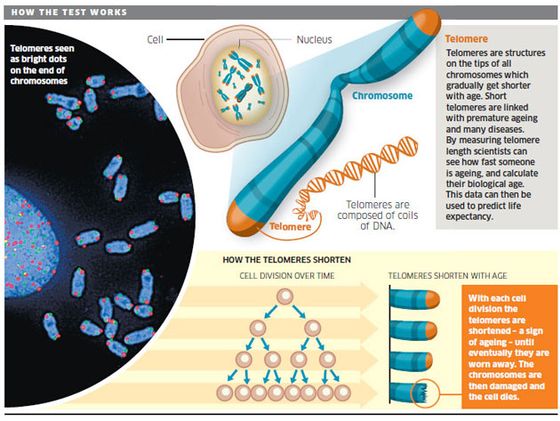A simple blood test that tells you how long you’ll live
Source: independent.co.uk
DNA breakthrough heralds new medical era – and opens ethical Pandora’s box.
A blood test that can show how fast someone is ageing – and offers the tantalising possibility of estimating how long they have left to live – is to go on sale to the general public in Britain later this year.
The controversial test measures vital structures on the tips of a person’s chromosomes, called telomeres, which scientists believe are one of the most important and accurate indicators of the speed at which a person is ageing.
Scientists behind the €500 (£435) test said it will be possible to tell whether a person’s "biological age", as measured by the length of their telomeres, is older or younger than their actual chronological age.

Telomeres are structures on the tips of all chromosomes which gradually get shorter with age. Short telomeres are linked with premature ageing and many diseases. By measuring telomere length scientists can see how fast someone is ageing, and calculate their biological age. This data can then be used to predict life expectancy.
Medical researchers believe that telomere testing will become widespread within the next five or 10 years, but there are already some scientists who question its value and whether there should be stronger ethical controls over its wider use. In addition to concerns about how people will react to a test for how "old" they really are, some scientists are worried that telomere testing may be hijacked by unscrupulous organisations trying to peddle unproven anti-ageing remedies and other fake elixirs of life.
The results of the tests might also be of interest to companies offering life-insurance policies or medical cover that depend on a person’s lifetime risk of falling seriously ill or dying prematurely. However, there is a growing body of scientific opinion that says testing the length of a person’s telomeres could provide vital insights into the risk of dying prematurely from a range of age-related disorders, from cardiovascular disease to Alzheimer’s and cancer. "We know that people who are born with shorter telomeres than normal also have a shorter lifespan. We know that shorter telomeres can cause a shorter lifespan," said Maria Blasco of the Spanish National Cancer Research Centre in Madrid, who is the inventor of the new commercial telomere test. "But we don’t know whether longer telomeres are going to give you a longer lifespan. That’s not really known in humans," she added.
"What is new about this test is that it is very precise. We can detect very small differences in telomere length and it is a very simple and fast technique where many samples can be analysed at the same time. Most importantly, we are able to determine the presence of dangerous telomeres – those that are very short."
Dr Blasco’s company, Life Length, is in talks with medical diagnostic companies across Europe, including the UK, to market the test and collect blood samples for analysis in Spain. A deal with a company operating in Britain is likely within a year, she said.
"We need to have a clinical company to send us the blood [samples]. We are in contact with several groups in the UK who are interested," Dr Blasco said.
Life Length is anticipating hundreds of requests from people wanting to have their telomeres tested and is expecting demand from thousands more once the company is able to bring down the cost of the test as public demand increases.
Although Life Length is not the only company selling telomere tests, it is the only one gearing up for over-the-counter sales to the public and the only company with an accurate-enough test to be of practical use, said Professor Jerry Shay of the University of Texas Southwestern Medical Centre in Dallas.
"This test devised by Blasco is so accurate that it is likely to provide more useful information than some of the other tests out there right now," said Professor Shay, who is a scientific consultant for Life Length. "What’s important in ageing is the shortest telomeres. What makes cells stop growing is the shortest telomeres, not the average telomere length, which is what other tests look at.
"Everyone talks about the chronological age, but there is also a biological age, and telomere length is actually a pretty good representation of your biological age. Telomeres are important – there is no question of that," he said.
Read the full article at: independent.co.uk
i>Images: Source: Independent.co.uk
New, Inexpensive Blood Test Tells You "How Long You Will Live" ... But You Can Cheat and Live Longer
From: GeorgeWashington’sBlog
 Ethics
EthicsMark my words, a tidal wave of ethical issues has been released by the new, inexpensive (around $700 U.S. dollars) blood test for telomere length.
Initially, every life insurer in the world will demand that all applicants get the test, for obvious reasons. If you’re telomeres are really short, you won’t live as long ... which radically shifts the actuarial data. Indeed, as shown below, short telomeres might even outweigh risk factors such as smoking.
While life insurance will be the area most directly impacted by the new blood test, many other areas of life could be affected as well. For example, health insurers may want their insureds to get tests as well, on the theory that people with shorter telomeres will need more medical care ... and should thus pay higher premiums. As the Independent notes:
The results of the tests might ... be of interest to companies offering life-insurance policies or medical cover that depend on a person’s lifetime risk of falling seriously ill or dying prematurely.
Employers may want their candidates to take the blood test. After all, why spend years training someone who might soon kick the bucket?
Even lovers might insist their would-be spouses get a test before saying I do. It’s no fun to have kids with someone who won’t be there to raise them.
How to cheat
Exercise lengthens telomeres. As the Post-Gazette writes:
People who exercise regularly are up to nine years younger, biologically, than sedentary people of the same chronological age, according to a new study by a team of British researchers.
You already knew that people who keep fit live longer than people who don’t. Studies have shown they’re less likely to have heart attacks, or to suffer from diabetes, cancer and other degenerative diseases. What makes this study by a team from Kings College in London different from all others that have come before it is that it may explain why.
***
"Exercise helps protect against the slowing-down mechanism."
[...]
Read the full article at: georgewashington2.blogspot.com






















